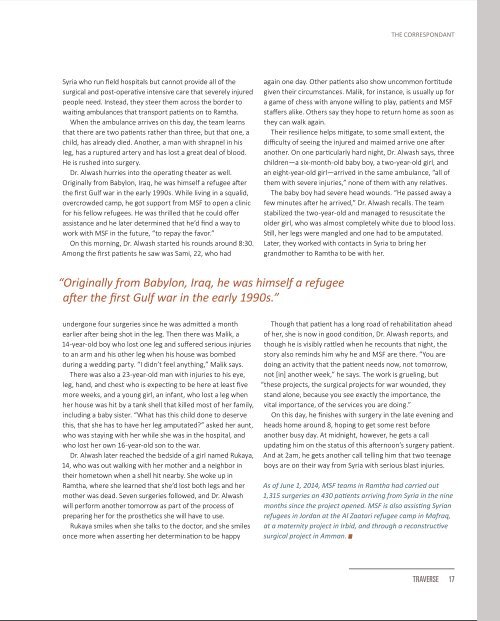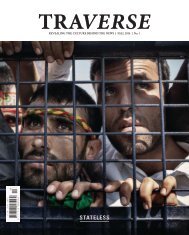Create successful ePaper yourself
Turn your PDF publications into a flip-book with our unique Google optimized e-Paper software.
THE CORRESPONDANT<br />
Syria who run field hospitals but cannot provide all of the<br />
surgical and post-operative intensive care that severely injured<br />
people need. Instead, they steer them across the border to<br />
waiting ambulances that transport patients on to Ramtha.<br />
When the ambulance arrives on this day, the team learns<br />
that there are two patients rather than three, but that one, a<br />
child, has already died. Another, a man with shrapnel in his<br />
leg, has a ruptured artery and has lost a great deal of blood.<br />
He is rushed into surgery.<br />
Dr. Alwash hurries into the operating theater as well.<br />
Originally from Babylon, Iraq, he was himself a refugee after<br />
the first Gulf war in the early 1990s. While living in a squalid,<br />
overcrowded camp, he got support from MSF to open a clinic<br />
for his fellow refugees. He was thrilled that he could offer<br />
assistance and he later determined that he’d find a way to<br />
work with MSF in the future, “to repay the favor.”<br />
On this morning, Dr. Alwash started his rounds around 8:30.<br />
Among the first patients he saw was Sami, 22, who had<br />
again one day. Other patients also show uncommon fortitude<br />
given their circumstances. Malik, for instance, is usually up for<br />
a game of chess with anyone willing to play, patients and MSF<br />
staffers alike. Others say they hope to return home as soon as<br />
they can walk again.<br />
Their resilience helps mitigate, to some small extent, the<br />
difficulty of seeing the injured and maimed arrive one after<br />
another. On one particularly hard night, Dr. Alwash says, three<br />
children—a six-month-old baby boy, a two-year-old girl, and<br />
an eight-year-old girl—arrived in the same ambulance, “all of<br />
them with severe injuries,” none of them with any relatives.<br />
The baby boy had severe head wounds. “He passed away a<br />
few minutes after he arrived,” Dr. Alwash recalls. The team<br />
stabilized the two-year-old and managed to resuscitate the<br />
older girl, who was almost completely white due to blood loss.<br />
Still, her legs were mangled and one had to be amputated.<br />
Later, they worked with contacts in Syria to bring her<br />
grandmother to Ramtha to be with her.<br />
“Originally from Babylon, Iraq, he was himself a refugee<br />
after the first Gulf war in the early 1990s.”<br />
undergone four surgeries since he was admitted a month<br />
earlier after being shot in the leg. Then there was Malik, a<br />
14-year-old boy who lost one leg and suffered serious injuries<br />
to an arm and his other leg when his house was bombed<br />
during a wedding party. “I didn’t feel anything,” Malik says.<br />
There was also a 23-year-old man with injuries to his eye,<br />
leg, hand, and chest who is expecting to be here at least five<br />
more weeks, and a young girl, an infant, who lost a leg when<br />
her house was hit by a tank shell that killed most of her family,<br />
including a baby sister. “What has this child done to deserve<br />
this, that she has to have her leg amputated?” asked her aunt,<br />
who was staying with her while she was in the hospital, and<br />
who lost her own 16-year-old son to the war.<br />
Dr. Alwash later reached the bedside of a girl named Rukaya,<br />
14, who was out walking with her mother and a neighbor in<br />
their hometown when a shell hit nearby. She woke up in<br />
Ramtha, where she learned that she’d lost both legs and her<br />
mother was dead. Seven surgeries followed, and Dr. Alwash<br />
will perform another tomorrow as part of the process of<br />
preparing her for the prosthetics she will have to use.<br />
Rukaya smiles when she talks to the doctor, and she smiles<br />
once more when asserting her determination to be happy<br />
Though that patient has a long road of rehabilitation ahead<br />
of her, she is now in good condition, Dr. Alwash reports, and<br />
though he is visibly rattled when he recounts that night, the<br />
story also reminds him why he and MSF are there. “You are<br />
doing an activity that the patient needs now, not tomorrow,<br />
not [in] another week,” he says. The work is grueling, but<br />
“these projects, the surgical projects for war wounded, they<br />
stand alone, because you see exactly the importance, the<br />
vital importance, of the services you are doing.”<br />
On this day, he finishes with surgery in the late evening and<br />
heads home around 8, hoping to get some rest before<br />
another busy day. At midnight, however, he gets a call<br />
updating him on the status of this afternoon’s surgery patient.<br />
And at 2am, he gets another call telling him that two teenage<br />
boys are on their way from Syria with serious blast injuries.<br />
As of June 1, 2014, MSF teams in Ramtha had carried out<br />
1,315 surgeries on 430 patients arriving from Syria in the nine<br />
months since the project opened. MSF is also assisting Syrian<br />
refugees in Jordan at the Al Zaatari refugee camp in Mafraq,<br />
at a maternity project in Irbid, and through a reconstructive<br />
surgical project in Amman.<br />
<strong>TRAVERSE</strong> 17



